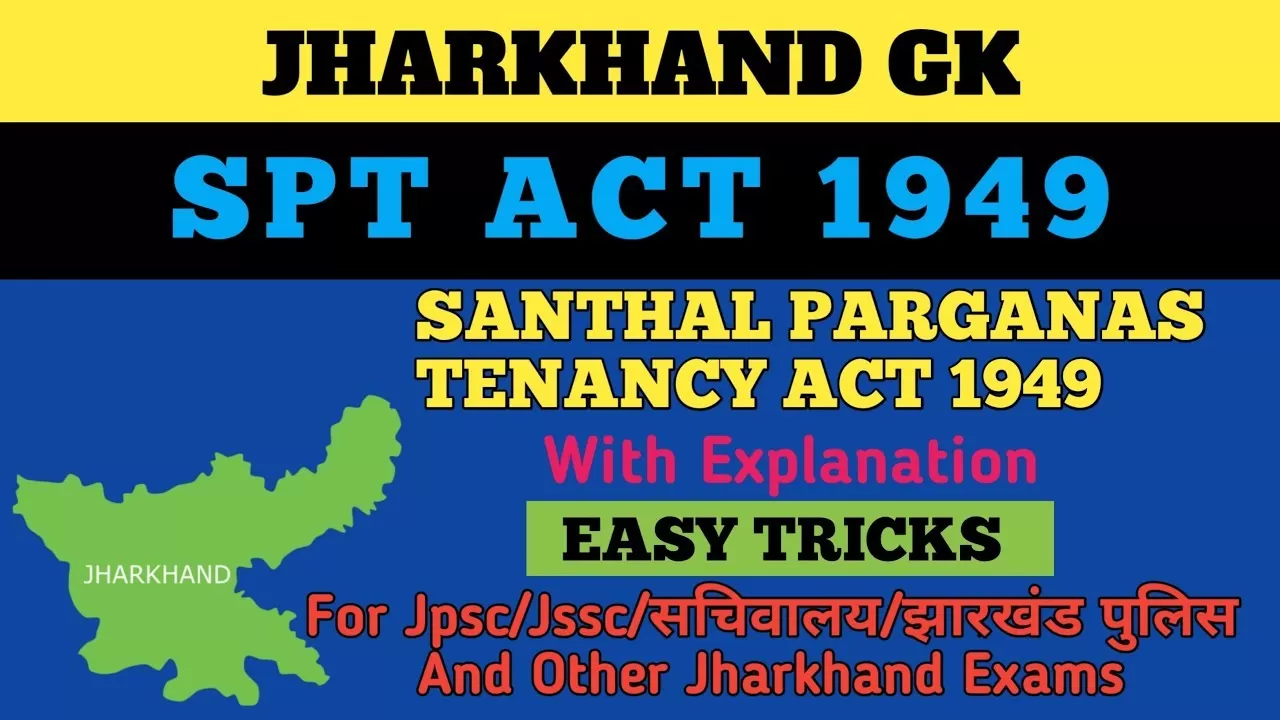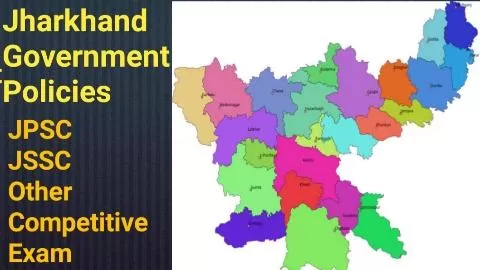अध्याय-1 (प्रारंभिकी)
इस अध्याय में 4 धारा है।
धारा 1
इस धारा में तीन बिंदु को बताया गया है:- इस अधिनियम का संक्षिप्त नाम, इस अधिनियम का प्रारम्भ और इस अधिनियम का प्रसार
संक्षिप्त नाम – यह अधिनियम संक्षिप्त रूप से SPT Act 1949 के नाम से जाना जाएगा।
प्रारम्भ – इसका प्रारम्भ उस तिथि से माना जाएगा जिस तिथी को राज्य सरकार अधिसूचना द्वारा तिथि प्रकाशित करेगा। Act बनने के बाद बिहार सरकार ने अधिसूचना द्वारा यह तिथि 01 नवंबर 1949 से जारी की। अतः यह Act 01 नवंबर 1949 से प्रभावी हुआ।
विस्तार – यह एक्ट पूरे संताल परगना प्रमंडल में लागू होगा। अर्थात यह दुमकर, देवघर, जामताड़ा, गोड्डा, साहेबगंज, पाकुड़ और गोड्डा जिले के सम्पूर्ण क्षेत्र पर प्रभावी रहेगा।
धारा 2
इस धारा के अंतर्गत SPT Act को किसी क्षेत्र से हटाने तथा पुनः लागू करने की बात की गई है।
Clause 1- राज्य सरकार अधिसूचना जारी करके संताल परगना के किसी भी क्षेत्र में SPT Act को पूरी तरह या आंशिक रूप से वापस ले सकती है। और पुनः अधिसूचना जारी कर उस क्षेत्र में SPT Act को पूर्णतः या आंशिक रूप से लागू कर सकती है।
Clause 2 – SPT Act की किसी क्षेत्र से वापसी निम्न बिंदुओं को प्रभावित नही करेगा:-
a) इस Act के तहत चल रही पूर्व कार्यवाही को।
b) किसी right, obligation, privilege अथवा liability को जो कानून वापसी से पहले इस Act के अंतर्गत स्थापित की गई हो।
c) किसी penalty, forfeiture or punishment को जो कानून वापसी से पहले इस Act के अंतर्गत स्थापित की गई हो।
d) किसी Investigation, Legal Proceeding Or Remedy को जो उपरोक्त right, obligation, privilege, liability, penalty, forfeiture or punishment को स्थापित करने के लिए शुरु हुई हो।
धारा 3
इस धारा के अंतर्गत Schedule A के 4th Column में दी गई Enectments को हटाया गया है।
SCHEDULE -A
| Year | Part | Short Title | Extent Of Repeal |
| 1872 | ।।। | The SP Settlement Regulation, 1872 | Sec-27 & Sec-28 |
| 1886 | ।। | The SP Rent Regulation, 1886 | Sec-25 & Sec-25A |
| 1907 | ।।। | The SP Rent (Amendment) Regulation, 1907 | Sec-8 |
| 1934 | । | The SP Settlement (Amendment) Regulation, 1934 | Sec-2 |
| 1944 | । | The SP Settlement (Amendment) Regulation, 1944 | The Whole |
Note:- धारा 3 के तहत उपरोक्त table के 4th Column में लिखा हुआ धाराओं को हटा दिया गया है।
धारा – 4
इस धारा में इस Act में प्रयुक्त विभिन्न 23 शब्दावलियों को परिभाषित किया गया है:-
a) Aboriginal – वो व्यक्ति Aboriginal या Semi-Aboriginal जाती या जनजाति कहलाएगा जो SCHEDULE-B में वर्णित है। राज्य सरकार अधिसूचना जारी कर किसी वर्ग को SCHEDULE-B में सम्मिलित या सूची से बाहर कर सकती है।
SCHEDULE-B
निम्न वर्ग को Schedule-B के तहत Aboriginal अथवा Sub-Aboriginal माना गया है।
| 1. बाउरी 2. धांगर 3. डोम 4. हाड़ी 5. कोल | 6. कोरा 7. माहली 8. पहारिया 9. रजवार 10. संताल |
b) Agriculture Year – इस Act के तहत कृषि वर्ष की शुरवात निम्न तिथि को मानी जाएगी
A) पहला बैशाख – जहाँ बंगाली वर्ष प्रचलित है।
B) प्रथम आश्विन – जहां फसली वर्ष प्रचलित है।
Note:- जहां राज्य सरकार भूस्वामी है वहां अप्रैल महीने के पहले दिन को कृषि वर्ष की शुरुआत मानी जाएगी।
c) Bhugat-Bandha/भुक्तबंध/भोगबंधक (Complete Usufructuary Mortgage) – अगर कोई रैयत अपनी जोत का पूरा भाग या आंशिक भाग किसी व्यक्ति के पास गिरवी रखता है। इसके बदले में अगर रैयत कुछ पैसे उधार लेता है। इस स्थिति में जोत से उत्पन्न लाभ को ही उस उधार-राशि का ब्याज माना जाएगा। रैयत को गिरवी से अपने जोत को छुड़ाने के लिए सिर्फ मूलधन ही चुकाना पड़ेगा।
d) Commissioner (आयुक्त)- इस Act में प्रयुक्त Commissioner का मतलब संताल परगना प्रमंडल के Commissioner को माना जाएगा।
e) Community (समुदाय)- Community का मतलब वो सामाजिक समुदाय जिसमे कोई व्यक्ति आता है। इस Act के आधार पर दो ही Community आते है:- Aboriginal और Non-Aboriginal
f) Deputy Collector (उप समाहर्ता) – Deputy Collector के अंतर्गत Assistant Collector और Sub-Deputy Collector को शामिल किया जाएगा।
g) Deputy Commissioner (उपायुक्त) – Deputy Commissioner का मतलब जामताड़ा, दुमका, देवघर, गोड्डा, साहेबगंज और पाकुड़ का Deputy Commissioner माना जाएगा। इसके अंतर्गत निम्न अधिकारियों को भी सम्मिलित किया जाएगा:-
A) अगर राज्य सरकार किसी कार्य को करने के लिए Additional Collector (अतिरिक्त उपायुक्त) या सब अनुमंडल अधिकारी (Subdivisional Officer) अथवा Deputy Collector (उप समाहर्ता) को नियुक्त करता है।
B) कोई Deputy Collector (उपसमाहर्ता) जिसे राज्य सरकार के नियंत्रण के अधीन उपायुक्त सामान्य अथवा विशेष आदेश द्वारा इस अधिनियम के अधीन किसी कार्य संपादन के लिए अधिकृत करता हो।
h) Holding (जोत) – रैयत के पास जितनी अपनी जमीन है जिसमे उसका मालिकाना हक है उसे उस रैयत की जोत कही जाती है।
i) Khas Village (खास ग्राम) – खास ग्राम का मतलब वैसा गांव जिसमे न कोई मूल रैयत (Mularaiyat) हो न ही कोई ग्राम-प्रधान (Village Headman)
j) Landlord (भूस्वामी) – Village Headman और Mularaiyat के आलावे उस व्यक्ति को को जमींदार कहा जाएगा जिसे Rent (लगान) लेने का अधिकार प्राप्त है। Landlord के अंतर्गत Proprietor, Tenure Holder, Ghatwal और Govenment को शामिल किया जा सकता है।
k) Non-Aboriginal (गैर-आदिवासी)- वो व्यक्ती जिसके समुदाय का वर्णन Schedule B में नहीं है वह Non -Aboriginal माना जाएगा।
l) Prescribed (विनिहित)- Prescribed का मतलब State Government द्वारा SPT Act के अंतर्गत निर्धारित Rules.
m) Raiyat (रैयत) – जमींदार के अलावा कोई ऐसा व्यक्ति जो खुद या परिवार के सदस्य या भाड़े के मजदूर द्वारा खेती के लिए भूमि को धारण करने का अधिकार रखता है।
Note:- ग्राम प्रधान अपने निजी जोत का रैयत हो सकता है।
n) Recorded (अभिलिखित)- Recoded का मतलब जो Record Of Right में लिखा हुआ है।
o) Rent (लगान)- Record Of Right के अनुसार विधिसम्मत तरीके से पैसे के रूप में Village Headman या Mulraiyat के द्वारा Landlord को किया जाने वाला भुगतान Rent कहलाता है।
p) Santal Civil Rules (संताल सिविल रूल्स)- Santal Parganas Act, 1855 के Section 1(2) के अधिनियम 37 के तहत नियुक्त किसी अधिकारी द्वारा संताल परगना में Civil Justice के लिए बनाया गया Rules.
q) Santal Parganas (संताल परगना) – संताल परगना का मतलब संताल परगना प्रमंडल समझा जायेगा जिसके अंतर्गत जामताड़ा, दुमका, देवघर, गोड्डा, साहेबगंज और पाकुड़ जिला आता है।
r) Settlement Rate Of Rent (लगान की बंदोबस्तीदर)- यह लगान (Rent) की दर है जो Settlement Rate के नाम से Record-Of-Right मे वर्णित है।
s) Tenant (भूधारक)- Tenant के अंतर्गत Tenure Holder, Village Headman और Mulraiyat आता है।
t) Vacant Holding (खाली जोत) – जब कोई रैयत बिना उत्तराधिकारी के मर जाता है तो उसके जोत को खाली जोत (Vacant Holding) कहा जाता है।
u) Village – SPT Act के तहत ग्राम का मतलब है:-
a) वह क्षेत्र जिसे Map और Record of Right में अलग गांव के रुप में Defined (परिभाषित), survey (परिमापित) और record (अभिलिखित) किया गया हो। साथ ही वह Map और Record of Right को उस समय लागु किसी Law के तहत बनाया गया हो।
b) तथा जहां survey नही हुआ है तथा किसी Law के अन्तर्गत Record of Right तैयार नहीं किया जा सका हो उस क्षेत्र को Deputy Commissioner किसी General Order या Special Order के द्वारा ग्राम घोषित कर दिया हो। इसमें आयुक्त (Commissioner) की सहमति मिलना अनिवार्य है।
v) Village Community (ग्राम-समुदाय)- गाँव के सभी जमाबंदी रैयत, उसके हिस्सेदार, बच्चे और उत्तराधिकारी के समूह को ग्राम -समुदाय (Village Community) कहा जाता है।
w) Village Headman – इस Act के पहले या बाद में Deputy Commissioner द्वारा निर्धारित ग्राम-प्रमुख को Village Headman कहा जाता है। Village Headman को मांझी, मुस्ताजिर, प्रधान या अन्य नाम से जाना जाता है। Mularayait (मूल रैयत) Village Headman नही होता है।
Chapter-1(Preliminary)
This chapter has 4 sections.
Section 1
This section states three points – Short title of this Act, Commencement of this Act and Extent of this Act
Short title –This Act may be known as the SPT Act, 1949.
Commencement –It shall be deemed to commence from the date on which the State Government may by notification publish the date. After the enactment of the Act, the Bihar government issued this date by notification from 01 November 1949. Hence, this Act came into effect from 01 November 1949.
Expansion – This Act will be applicable in the entire Santhal Pargana division. That is, it will be effective in the entire area of Dumkar, Deoghar, Jamtara, Godda, Sahebganj, Pakur and Godda districts.
Section 2
Under this section there is a provision for removing the SPT Act from an area and then re-implementing it.
Clause 1- The State Government may, by notification, withdraw the SPT Act wholly or partially in any area of Santhal Pargana, and can again issue notification and implement the SPT Act fully or partially in that area.
Clause 2 – The withdrawal of the SPT Act from any area will not affect the following points:-
a) Previous proceedings pending under this Act.
b) Any right, obligation, privilege or liability established under this Act before the repeal of the Act.
c) Any penalty, forfeiture or punishment imposed under this Act before the repeal of the Act.
d) Any investigation, legal proceeding or remedy initiated to establish the above right, obligation, privilege, liability, penalty, forfeiture or punishment.
Section 3
Under this section, the enactments given in the 4th Column of Schedule A have been removed.
SCHEDULE -A
| Year | Part | Short Title | Extent Of Repeal |
| 1872 | ।।। | The SP Settlement Regulation, 1872 | Sec-27 & Sec-28 |
| 1886 | ।। | The SP Rent Regulation, 1886 | Sec-25 & Sec-25A |
| 1907 | ।।। | The SP Rent (Amendment) Regulation, 1907 | Sec-8 |
| 1934 | । | The SP Settlement (Amendment) Regulation, 1934 | Sec-2 |
| 1944 | । | The SP Settlement (Amendment) Regulation, 1944 | The Whole |
Note:- The sections written in the 4th column of the above table under section 3 have been deleted.
Section – 4
This section defines 23 different terms used in the Act:-
a) Aboriginal – That person shall be called Aboriginal or Semi-Aboriginal race or tribe as described in SCHEDULE-B. The State Government can issue a notification and include or exclude any category from SCHEDULE-B.
SCHEDULE-B
The following classes have been considered Aboriginal or Sub-Aboriginal under Schedule-B.
| 1. Bauri 2. Dhangar 3. Dom 4. Haadi 5. Kol | 6. Kora 7. Mahli 8. Paharia 9. Rajwar 10. Santal |
b) Agriculture Year – Under this Act, the beginning of the agriculture year will be considered on the following date
A) First Baishakh – where the Bengali year is prevalent.
B) Pratham Ashvin – where the crop year is prevalent.
Note:- Where the State Government is the landowner, the first day of the month of April will be considered as the beginning of the agricultural year.
c) Bhugat-Bandha (Complete Usufructuary Mortgage) – If a tenant mortgages all or part of his land holding to any person. In return, if the raiyat borrows some money, in this situation the profit generated from the land will be considered as the interest on that loan amount. To redeem his land from mortgage, the peasant would have to pay only the principal amount.
d) Commissioner – Commissioner used in this Act shall be deemed to mean the Commissioner of Santhal Pargana Division.
e) Community – Community means the social community in which a person belongs. On the basis of this Act, there are only two communities: Aboriginal and Non-Aboriginal.
f) Deputy Collector– Deputy Collector के अंतर्गत Assistant Collector और Sub-Deputy Collector को शामिल किया जाएगा।
g) Deputy Commissioner – Deputy Commissioner will be considered as the Deputy Commissioner of Jamtara, Dumka, Deoghar, Godda, Sahebganj and Pakur. The following officers will also be included under this:-
A) If the State Government appoints Additional Collector or Sub-Divisional Officer or Deputy Collector to do any work.
B) Deputy Collector – Whom the Deputy Commissioner, under the control of the State Government, by general or special order, authorises to perform any function under this Act.
h) Holding – Whatever land a Raiyat has in which he has ownership rights is called his holding.
i) Khas Village – Khas Gram means a village in which there is neither any original Raiyat nor any Village Headman.
j) Landlord – Apart from the Village Headman and Mularaiyat, the person who has the right to collect rent will be called the landlord. Proprietor, Tenure Holder, Ghatwal and Government can be included under Landlord.
k) Non-Aboriginal – A person whose community is not described in Schedule B will be considered Non-Aboriginal.
l) Prescribed – Prescribed means the rules prescribed by the State Government under the SPT Act.
m) Raiyat – Any person other than the landlord who has the right to hold the land for cultivation either by himself or by a family member or by hired labour.
Note:- The village head can be thehe tenant of his personal land.
n) Recorded – Recoded means that which is written in Record of Right.
o) Rent- As per the Record of Right, the payment made by the Village Headman or Mulraiyat to the Landlord in the form of money in a legal manner is called Rent.
p) Santal Civil Rules – Rules made for the administration of Civil Justice in the Santal Parganas by any officer appointed under Act 37 of Section 1(2) of the Santal Parganas Act, 1855.
q) Santal Parganas – Santhal Pargana will be understood to mean Santhal Pargana Division under which Jamtara, Dumka, Deoghar, Godda, Sahebganj and Pakur districts come.
r) Settlement Rate Of Rent – This is the rate of rent which is mentioned in the Record-Of-Right by the name of Settlement Rate.
s) Tenant – Tenant includes Tenure Holder, Village Headman and Mulraiyat.
t) Vacant Holding – When a raiyat dies without an heir, his holding is called vacant holding.
u) Village – Under SPT Act, Village means:-
a) An area which has been defined, surveyed and recorded as a separate village in the map and Record of Right. Also, that Map and Record of Right should have been made under any law in force at that time.
b) And where survey has not been done and Record of Right could not be prepared under any law, the Deputy Commissioner may have declared that area as a village through any General Order or Special Order. It is mandatory to get the consent of the Commissioner in this.
v) Village Community- The group of all the Jamabandi Raiyats of the village, their shareholders, children and successors is called the Village Community.
w) Village Headman – Before or after this Act, the village head appointed by the Deputy Commissioner is called Village Headman. The Village Headman is known as Manjhi, Mustajir, Pradhan or by other names. Mularayait is not the Village Headman.



